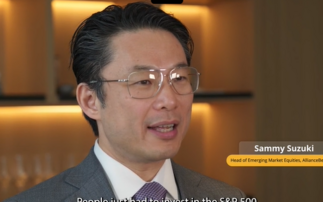At this time of the year, Chinese tourists would typically be seen visiting and spending across a number of global destinations. But with most overseas travel off-limits, Fidelity China Consumer Fund portfolio manager Hyomi Jie analyses the key domestic areas which could benefit from increased consumer spending.
China's online retail sales have remained resilient throughout the pandemic, despite an ongoing contraction in retail sales overall. This has been supported by the millions of Chinese travellers with nowhere to go. Previously, spending on travel and education abroad amounted to US$260bn per year. Now, in the wake of the Covid-19 outbreak, some of this money is instead being channelled into the domestic economy.
China retails sales hold up
Source: Refinitiv Datastream, Wind, Fidelity International, July 2020.
While part of this spending will be a short-term boost from releasing pent-up demand, we think a significant portion will also be structural and sustained. We estimate this ‘re-shored' consumption could amount to roughly US$150bn this year and US$100bn in each of the coming three years. Therefore, identifying the longer-term beneficiaries of this trend will have significant investment implications.
As re-shored consumption will be mostly driven by the type of wealthier consumers who could afford to travel overseas or send their kids abroad in the first place, we think this will accelerate a few other trends which were already underway: a shift from goods to services consumption, and a growing preference for premium products and for domestic brands. We expect this to benefit sectors like online services, luxury products, beauty, sportswear, premium cars, and short-range travel/holiday destinations
Travel and education is re-shoring
If you're an affluent Chinese family that needs to set aside travel plans, the obvious alternative is exploring places closer to home. Consider the result of a recent survey among Fidelity's staff in our Shanghai and Dalian offices. It showed that 375 of the 178 respondents are willing to travel domestically on holiday before 30 September (up from 11% in April), while 93% are unwilling to travel overseas until next year at the earliest. We've heard similar news from leisure and travel operators like Trip.com or Meituan - their domestic business recovery is much stronger than outbound travel.
Fidelity China office survey - when would you be comfortable planning an overseas holiday?
Source: Fidelity International, July 2020.
As with travel, much of the spending on overseas education will be redirected onshore. Although some secondary and university students have delayed or cancelled their plans to study abroad, spending on education ranks among the last items that Chinese families will curtail in bad times. The acceleration in online education, together with the restart of offline classes, should help to offset the weakness in the overseas test prep business.
For education service providers, children from upper-middle class families previously liked to go overseas during summer for special camps or other studies. But this year many are continuing their studies in China, where most of physical classes have resumed. Meanwhile, as some offline tutoring centres have gone out of business, the online leaders will likely gain further share of the market. There's ample room for consolidation as the only two national players, TAL Education and New Oriental, collectively account for less than 6% of China's tutoring market.
Premiumisation and the rise of domestic brands
Chinese consumers have been trading up across different consumer product categories for years. The re-shoring of spending, which was mainly concentrated among wealthier individuals, is giving an added boost to higher-end products from premium travel packages to automobiles.
The domestic travel market has been clearly segmented between mass-market for leisure, and higher end for business travel. But travel operators are starting to see leisure demand for higher-end hotels and tour packages, especially from customers who would previously have travelled overseas.
Meanwhile, as Chinese people become better educated and more affluent, their confidence in their own country's products has increased compared to one or two decades ago. This is normal as economies grow and mature. Pop culture can be a barometer and it is interesting that while 10 years ago Chinese people preferred Korean or Japanese songs and movies, a lot of the content is now being developed by Chinese, for Chinese.
Chinese companies have also been quicker than foreign players to adapt to changing local tastes and requirements, for example using online sales channels like live broadcasting. Certain considerations for customers have become more important amidst the global pandemic, especially the focus on quality and after-sales service, tipping the balance further towards local brands.
Key takeaways
All in all, we think this de-globalisation trend will continue and we're likely to see reshoring of consumption in other countries as well. Within China, rising international tensions have had the effect of boosting national sentiment, and this is being expressed in consumption patterns. Sportswear brand Li-Ning is one beneficiary of this heightened patriotism - once considered an outdated company, it's now seen as hip and its recent designs prominently featuring traditional Chinese elements have been well-received.
The reshoring of consumer demand is also backed by a growing perception that Chinese brands are improving in terms of design and quality. We think the trend is only going to accelerate further, as Chinese people continue getting wealthier and upgrading their consumption patterns.
Join our experts for a new CPD accredited virtual event series to learn how the Investment landscape in Asia is changing and to understand the key opportunities that are emerging.
This information is for investment professionals only and should not be relied upon by private investors.
This information is for investment professionals only and should not be relied upon by private investors. The ideas and conclusions here do not necessarily reflect the views of Fidelity's portfolio managers and are for general interest only. Investors should note that the views expressed may no longer be current and may have already been acted upon. Reference to specific securities should not be interpreted as a recommendation to buy or sell these securities but is included for the purposes of illustration only. The Fidelity China Consumer Fund can use financial derivatives which may expose it to a higher degree of risk and can cause investments to experience larger than average price fluctuations. Changes in currency exchange rates may affect the value of an investment in overseas markets. Investments in small and emerging markets can also be more volatile than other more developed markets. Investments should be made on the basis of the current prospectus, which is available along with the Key Investor Information Document and current and semi-annual reports, free of charge on request, by calling 0800 368 1732. Issued by Financial Administration Services Limited and FIL Pensions Management, authorised and regulated by the Financial Conduct Authority. Fidelity, Fidelity International, the Fidelity International logo and F symbol are trademarks of FIL Limited. UKM0620/31931/SSO/NA











